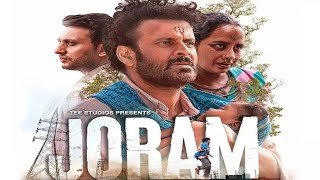Language: Hindi
Genre: Thriller / Political Drama / Survival
Director: Devashish Makhija
Lead Actor: Manoj Bajpayee
Narrative Summary (No Spoilers)
Joram tells the story of Bala (also known as Dasru), a tribal man who is living as an urban construction worker in a city far from his native roots. When his wife is brutally murdered under mysterious and politically charged circumstances, Bala is wrongfully implicated. He flees with his infant daughter in tow, desperate to escape the city’s corrupt machinery. What unfolds is a harrowing journey through jungles, towns, and memories as Bala attempts to return to his tribal homeland, hoping for safety and identity.
But the homeland he seeks has been transformed by deforestation, development projects, and corporate land grabs. Bala must confront not only a hostile environment but also the socio-political forces that have uprooted his people. The story becomes a collision between a father’s desperation to protect his child and a system built to erase him.
Themes and Core Concepts
- Displacement and Identity Loss
Joram explores what it means to be exiled from one’s culture and land—not just physically, but spiritually. Bala is not just running for safety; he’s running from erasure. - State Violence and Bureaucracy
The film critiques how state institutions, particularly law enforcement and the judiciary, often serve corporate and political interests rather than the people—especially the marginalized. - Environmental Destruction
The contrast between the dense forests of Bala’s youth and the barren, industrialized landscapes of the present reveals the brutal cost of “development.” Trees become symbols of memory and resistance. - Fatherhood as Resistance
Bala’s relationship with his infant daughter gives the film its emotional center. His love is not just protective—it is revolutionary. In a world trying to erase him, choosing to nurture, teach, and survive becomes an act of rebellion.
Character Study
Bala / Dasru (Manoj Bajpayee)
Bala is a deeply internal character—traumatized, resourceful, and stoic. He speaks little, but his face carries immense emotion. His transformation throughout the film—from a quiet worker to a hunted man reclaiming his identity—is tragic yet empowering. He doesn’t see himself as a hero, but the very act of surviving and protecting his daughter in such conditions elevates him.
Ratnakar (Mohammed Zeeshan Ayyub)
A police officer who tracks Bala, Ratnakar represents the “middle” India—educated, conflicted, complicit. As the pursuit progresses, he begins to question the morality of his orders. His arc is not just about catching Bala, but about confronting his own role in the system.
Supporting Characters
The supporting cast—tribal villagers, politicians, urban workers—serve as symbols of India’s fractured identity. Some try to help Bala, some exploit him, others remain indifferent, echoing the everyday complexity of social apathy.
Directorial Vision and Style
Devashish Makhija’s direction is minimalist, grim, and patient. He avoids melodrama and loud exposition. Instead, he lets long silences, tight close-ups, and vast open spaces tell the story. The camera often stays close to Bala, heightening the sense of claustrophobia and danger.
The color palette is stark: earthy browns, greys, and faded greens dominate the screen, evoking a world stripped of life and soul. The editing is sharp, especially in chase scenes, but the pacing is deliberate, almost meditative, allowing time for viewers to absorb the emotional and political weight of each scene.
Sound and Atmosphere
The sound design plays a major role in building tension. There’s little use of background score; instead, the ambient sounds of forests, trains, city bustle, and baby cries dominate. The absence of a musical crutch forces you to sit in the discomfort—just as Bala does.
Symbolism and Metaphors
- The baby is innocence, future, and burden—Bala must carry her both literally and symbolically as his last tether to life and meaning.
- Trains represent forced mobility—escape, pursuit, and the dehumanizing machinery of progress.
- Trees and land are more than just nature—they are memory, identity, and the graveyards of ancestral stories.
- Silence becomes a form of protest. The lack of dialogue is intentional; in a world where no one listens to the oppressed, words become useless.
Emotional Impact
This is not a film designed to entertain in a conventional sense. It leaves you feeling unsettled, angry, and reflective. The slow, grinding pace mirrors Bala’s struggle—there’s no easy resolution, no romanticized justice. The emotional power lies in the rawness: a father carrying a baby through an indifferent world.
Final Reflection
Joram is not just a survival thriller—it is a political poem in motion. Every frame is layered with pain, history, and resistance. It’s a film that challenges you to consider who we ignore, who we displace, and what stories go unheard in the name of growth.
If you watch it, prepare not for a thrill ride, but for a reckoning. And in the face of such stark honesty, the smallest acts of love and defiance—like carrying your child through hell become heroic.

